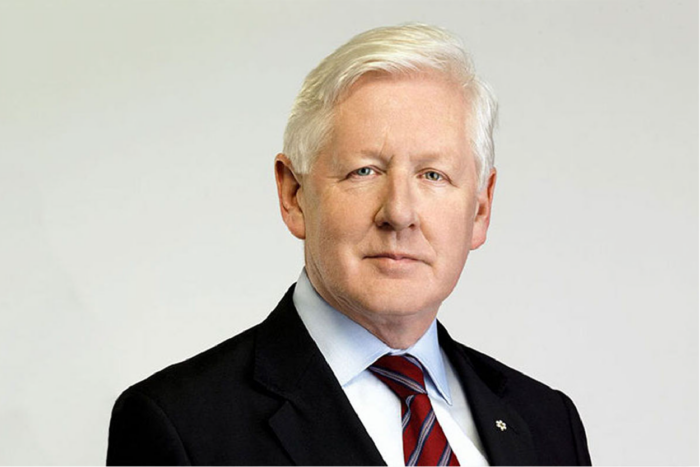Richard Madan: Manitoba’s man in Washington
For nearly a decade, Richard Madan made his mark in the corridors of Capitol Hill, pressing lawmakers with tough questions, mic in hand and camera in tow as a foreign correspondent in Washington, D.C., for CBC and CTV. Now, he’s still walking those same halls — just as the newly appointed Senior Representative to the United States for the province of Manitoba.
Richard Madan was recently appointed as Manitoba’s Senior Representative to the United States. / LINKEDIN PHOTO
He told Means & Ways he loved being a journalist and struggled with the decision to leave when the government approached him about the new job.
“The more I thought about it, I thought, you know, this is a once in a lifetime opportunity to advocate for an entire province, and it's a province I love,” he said. “So the more I thought about it, I thought, I have to do this.”
Madan has taken on a new challenge as Manitoba’s first-ever trade representative in Washington, a role created on the recommendation of the Premier’s Business and Jobs Council — or as Madan jokes, “how’s this for an acronym, PB and J.” At a time when Canada-U.S. relations face renewed uncertainty over tariffs and a looming renegotiation of USMCA, Madan sees the post as essential.
“If nobody's at the table, then you don't have a voice,” he said. “This is a critical time for Canada-U.S. relations. I mean, you can't say that enough.”
Ahead of the Council of the Federation meeting next week, where premiers are expected to discuss cross-border trade, the integrated supply chain and how provinces can present a united front in Washington, Madan spoke to Means & Ways about how he is already coordinating with counterparts from Alberta, Ontario and Quebec.
Different side
“The whole plan is to work together,” he said. “Everyone has a shared interest to be sure that the supply chain remains integrated, that the doors are staying open, not closing, and that the relationship continues to be strong.”
In his first few weeks, Madan has been busy meeting with several hundred stakeholders, while also navigating the steep learning curve that comes with trading a press badge for a diplomatic portfolio. “I would scrum members of Congress in the hallways on Capitol Hill with a camera in their face and a microphone. And now I'll be actually meeting with them, so I will see a whole different side of them,” he said.
The Q&A has been edited for length and clarity.
MW: Why was it important for Manitoba to have a trade office in Washington now?
RM: We're obviously in a critical time for Canada-U.S. relations. We're talking at the provincial level. A lot of the focus has been on the auto sector, steel and aluminum, critical minerals, but there are other sectors that are equally important, that have a profound impact in Manitoba. There's aerospace, agriculture, everything from pork, cattle, canola, everything under the sun that needs to be at the table as well, either defended or advocated for, and that's my role.
MW: What will your priorities be while you’re there?
RM: Manitoba's economy is so diversified. You've got agriculture, you also have steel, you also have heavy manufacturing. You also have aerospace, minerals, mining. So there are challenges because there are so many priorities, and there's not one big driver of the economy. It's balancing all these key sectors in the province and prioritizing. As I said, it's a diversified economy, which makes this role so much more important to advocate to Americans.
MW: What is the top issue right now for Manitoba when it comes to U.S. trade relations?
RM: Number one is we're all looking at these tariffs — the impact of tariffs, the impact of reciprocal tariffs, the upcoming USMCA renegotiations, making sure that what is compliant under the USMCA is safeguarded; and making sure the transborder shipments, the integrated sectors and agriculture aren't disrupted by the continued uncertainty. But ultimately, it's the uncertainty that is causing the greatest concern for most Manitoba stakeholders that I've dealt with — what is going to happen next? What is the tariff rate? What's happening with the USMCA? You know, what other rules will this administration or Congress implement that could be disruptive? So it's monitoring, tracking and advocating.
MW: What are you hearing on the ground there, in terms of the tariffs and trade war?
RM: Members of Congress will privately say to you, ‘I support Canada, I support USMCA. I don't support these tariffs,’ but many members of Congress will not say it publicly. They will not say it publicly at risk of drawing the wrath or retaliation from the administration. We saw what happened with Tom Massie, a Republican who voted against Trump. We saw how Trump treated Rand Paul over tariffs. So a lot of these Republicans, especially these vulnerable districts, as they head towards midterm elections next year, are reluctant to speak out or to criticize these policies publicly. Privately, they acknowledge that Canada is an important trading partner, and provinces play a major role in their local economies, particularly these northern states.
MW: You were in Manitoba recently speaking to local businesses, labour representatives and Indigenous leaders. How has the trade uncertainty affected them?
RM: They're deeply concerned about the uncertainty and how it affects their industries. The U.S. has been Manitoba’s primary trading partner, so any disruptions could have a major economic impact to them. So that's why it was so important to hear from them.
The whole idea of having a Manitoba representative in the United States was a recommendation from the Premier's Business and Jobs Council. Their recommendation is that this uncertainty and the trade negotiations are coming at such a critical time that they need to have a representative in Washington to ensure Manitoba's interests are defended and advocated for.
So I was there to listen to them, and yes, there's, there is tremendous uncertainty. That's their biggest concern — the tariffs, retaliation tariffs, steel, aluminum tariffs, what's going to happen with renegotiation of the USMCA, which is set for next year. The good news is that I know the ambassador [Kirsten Hillman]. I know Ontario's guy, David Paterson, Alberta just brought in a new person, Nathan Cooper, good guy. So we can all work together.
Ontario has a big presence in the U.S. Alberta has a big presence in the U.S. Manitoba, we're literally starting from nothing. It's a challenge getting this established, but it's so important that we finally have a presence here.
MW: The Council of the Federation is meeting next week. I assume Canada-U.S. trade is on the agenda. How is Manitoba working with other provinces in Washington right now to advance negotiations?
RM: The whole plan is to work together because Ontario, Alberta, Quebec and Manitoba, obviously everyone has a shared interest to be sure that the supply chain remains integrated, that the doors are staying open, not closing, and that the relationship continues to be strong. So from that perspective, everyone's coming from a united standpoint.
I've lived in the U.S. for 10 years, and I've been to events where you have Democrats and Republicans at the same industry group events where they blame each other for failure. The red states want the blue states to fail and vice versa. What I found so refreshing in Manitoba is that at these stakeholder meetings, you have conservatives, you have liberals, but they all put their politics aside because they want Manitoba to succeed.
MW: What are you looking forward to in your new role?
RM: So many things: meeting people, meeting members of Congress, meeting lawmakers at the state level, selling Manitoba’s story, promoting Manitoba’s economy, everything from its diverse economy to its tourism, the Arctic and polar bears — selling that to Americans. I miss telling stories about the White House and politics here in Washington, but in this new role, I'm telling a different story. I'm in a role advancing Manitoba's interest and telling the Manitoba story to Americans. And this is what I'm really looking forward to in this new role.






